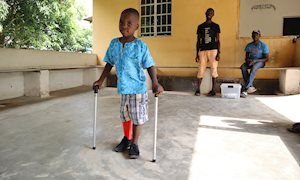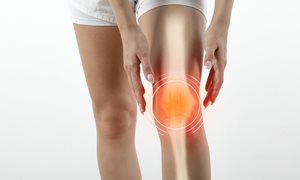14 May 2020
Their findings were in line with previous studies that found a harmful effect of corticosteroid and suggest that a conservative approach regarding the treatment of these patients with corticosteroid injections should be recommended. The Bone and Joint Journal made a short clip of their findings and their publication got a lot of social media attention.
Recent studies have suggested that corticosteroid injections into the knee may harm the joint resulting in cartilage loss and possibly accelerating the progression of osteoarthritis (OA). The aim of this study was to assess whether patients with, or at risk of developing, symptomatic osteoarthritis of the knee who receive intra-articular corticosteroid injections have an increased risk of requiring arthroplasty.
Methods
We used data from the Osteoarthritis Initiative (OAI), a multicentre observational cohort study that followed 4,796 patients with, or at risk of developing, osteoarthritis of the knee on an annual basis with follow-up available up to nine years. Increased risk for symptomatic OA was defined as frequent knee symptoms (pain, aching, or stiffness) without radiological evidence of OA and two or more risk factors, while OA was defined by the presence of both femoral osteophytes and frequent symptoms in one or both knees. Missing data were imputed with multiple imputations using chained equations. Time-dependent propensity score matching was performed to match patients at the time of receving their first injection with controls. The effect of corticosteroid injections on the rate of subsequent (total and partial) knee arthroplasty was estimated using Cox proportional-hazards survival analyses.
Results
After removing patients lost to follow-up, 3,822 patients remained in the study. A total of 249 (31.3%) of the 796 patients who received corticosteroid injections, and 152 (5.0%) of the 3,026 who did not, had knee arthroplasty. In the matched cohort, Cox proportional-hazards regression resulted in a hazard ratio of 1.57 (95% confidence interval (CI) 1.37 to 1.81; p < 0.001) and each injection increased the absolute risk of arthroplasty by 9.4% at nine years' follow-up compared with those who did not receive injections.
Conclusion
Corticosteroid injections seem to be associated with an increased risk of knee arthroplasty in patients with, or at risk of developing, symptomatic OA of the knee. These findings suggest that a conservative approach regarding the treatment of these patients with corticosteroid injections should be recommended.
Publication
Intra-articular corticosteroid injections increase the risk of requiring knee arthroplasty.
Wijn SRW, Rovers MM, van Tienen TG, Hannink G.

Their findings were in line with previous studies that found a harmful effect of corticosteroid and suggest that a conservative approach regarding the treatment of these patients with corticosteroid injections should be recommended. The Bone and Joint Journal made a short clip of their findings and their publication got a lot of social media attention.
Abstract
AimsRecent studies have suggested that corticosteroid injections into the knee may harm the joint resulting in cartilage loss and possibly accelerating the progression of osteoarthritis (OA). The aim of this study was to assess whether patients with, or at risk of developing, symptomatic osteoarthritis of the knee who receive intra-articular corticosteroid injections have an increased risk of requiring arthroplasty.
Methods
We used data from the Osteoarthritis Initiative (OAI), a multicentre observational cohort study that followed 4,796 patients with, or at risk of developing, osteoarthritis of the knee on an annual basis with follow-up available up to nine years. Increased risk for symptomatic OA was defined as frequent knee symptoms (pain, aching, or stiffness) without radiological evidence of OA and two or more risk factors, while OA was defined by the presence of both femoral osteophytes and frequent symptoms in one or both knees. Missing data were imputed with multiple imputations using chained equations. Time-dependent propensity score matching was performed to match patients at the time of receving their first injection with controls. The effect of corticosteroid injections on the rate of subsequent (total and partial) knee arthroplasty was estimated using Cox proportional-hazards survival analyses.
Results
After removing patients lost to follow-up, 3,822 patients remained in the study. A total of 249 (31.3%) of the 796 patients who received corticosteroid injections, and 152 (5.0%) of the 3,026 who did not, had knee arthroplasty. In the matched cohort, Cox proportional-hazards regression resulted in a hazard ratio of 1.57 (95% confidence interval (CI) 1.37 to 1.81; p < 0.001) and each injection increased the absolute risk of arthroplasty by 9.4% at nine years' follow-up compared with those who did not receive injections.
Conclusion
Corticosteroid injections seem to be associated with an increased risk of knee arthroplasty in patients with, or at risk of developing, symptomatic OA of the knee. These findings suggest that a conservative approach regarding the treatment of these patients with corticosteroid injections should be recommended.
Publication
Intra-articular corticosteroid injections increase the risk of requiring knee arthroplasty.
Wijn SRW, Rovers MM, van Tienen TG, Hannink G.
Related news items

3D-printing prosthesis legs in the middle of the jungle a video call with our colleague Merel in Sierra Leone
14 December 2021 'They sometimes think I'm a sorceress,' says technical physician Merel van der Stelt, while she smiles. 'Take this lady without a lower leg. Yesterday she came here. We scanned her stump and today she already has a 3D printed prosthesis. With a prosthesis people count again'. go to page
Survey of patients to address knee pain from removed meniscus
19 November 2021 Patients with persistent knee pain after meniscus removal can participate at three locations in the Netherlands in the AIR2 study by ATRO Medical, a spin-off of the Radboudumc and DSM. go to page
Turbo Grants for four medical-technical research projects
19 October 2021 Four TURBO grants were recently awarded to new technical-medical research proposals. The grants are part of the TURBO program, a collaboration between the University of Twente (TechMed Centre) and the Radboudumc. go to page
Broken teeth coronastress poses a danger to our teeth
6 May 2021 Teeth grinding and molars on top of each other: stress from corona causes an increase in dental damage. That's what they noticed at the department of dentistry at Radboudumc. go to page
BNR's Big Five of Surgery Maroeska Rovers
31 October 2018 Maroeska Rovers was a guest at BNR's Big Five of surgery. As a professor of Evidence Based Surgery she wants to make surgery better and more affordable. go to page